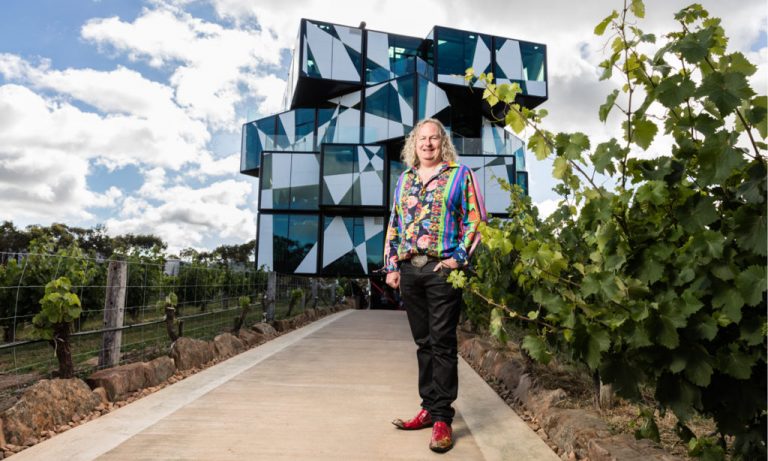Chester Osborn, chairman of Australia’s First Families of Wine
Australia’s First Families of Wine (AFFW) has called for the government to introduce key initiatives to address critical challenges facing the Australian wine sector. Initiatives it says were “notably absent” in the 2024 federal budget.
AFFW is made up of Brown Brothers, Campbells, d’Arenberg, Henschke, Howard Park, Jim Barry Wines, Tahbilk, Taylors, Tyrrell’s Wines and Yalumba.
The group said that a combination of global wine oversupply, high interest rates, rising operational costs due to high inflation, previously imposed Chinese tariffs, environmental challenges, and a market supressed by cost-of-living pressures, both domestically and in critical export markets, have “wreaked havoc” on the industry.
Chester Osborn, chairman of AFFW, and CEO of d’Arenberg in South Australia, said that the industry was currently facing a crisis.
“Many winery owners are communicating that this period is the most challenging period they have ever faced,” said Osborn. “Even more challenging than the mid-1980s when the now infamous vine pull scheme was introduced.”
Whilst the AFFW welcomed the recent announcement by the Chinese government that the tariffs have been removed, the group was quick to point out that while the impact of Chinese tariffs on Australian wine has been widely reported, the problem is much larger.
“The most concerning symptom is an enormous surplus of unsold bulk red wine,” said the organisation. AFFW also referenced Wine Australia’s figures, which report that red wine stock levels are currently at 2.77 times current annual sales forecast.
“The current surplus is approximately ten times the amount of wine sold to China at its pre-Covid peak. Furthermore, the market has changed. Wine consumption in China is estimated at about half its pre-Covid levels and the absence of Australian imports has seen the void filled by other international winemakers such as South America and South Africa.
“Undercurrent conditions it will take many years to clear the industries red wine surplus. China will not solve the problem.
“The solution is far from simple and requires action on both the supply and the demand side of the equation.”
Robert Hill-Smith of Yalumba said he believes some tough calls need to be made.
“This current state of play is not a market cycle waiting for self-correction, it requires permanent restructuring of supply and capacity.”
“To ensure long term sustainability, the sad reality is that inland and other regional red grape producing vineyards need to be removed and the industry needs to be drastically downsized by twenty-five to thirty percent.”
AFFW is calling on the Federal Government to provide assistance in the form of supporting an “environmentally friendly” exit from the industry for grapegrowers that need it. The group suggests this assistance could take the form of covering the cost of removal and destruction of treated pine posts, dripper tubes and wires.
AFFW suggested that “much of this could have been avoided” if government action had been taken sooner to support the industry in promoting itself internationally.
“The cost of which would be a fraction of what will be lost, but the true cost doesn’t end there,” said Osborn.
“While the value of the assets would be in the billions, vineyards are not commodities. The real investment is the time, patience and sheer hard work that goes into developing and maintaining them, that is what the industry stands to lose.”
On the demand side, AFFW said it believes the quality and pedigree of premium Australian wine is still desirable in overseas markets but in the current climate, the costs attached to marketing and promoting internationally are a “very real barrier” for struggling wine producers.
Alistair Purbrick of Tahbilk said immediate support is required.
“Whilst we positively acknowledge the creation of the One Grape & Wine Sector Plan, we urge AGW to now quickly create the short- and medium-term strategic activity plans which are required to ensure positive financial impacts to our industry,” said Purbrick.
AFFW is seeking government support in the form of grants and subsidies in order to restore and develop critical export markets, which it said will go some way towards alleviating the current over supply and lay an important foundation for future success.
In 2019, the Australian wine industry generated $45.5 billion for the Australian economy.
Much of that value is to regional employment and local economies around the nation, contributing 163,790 direct and indirect, full and part-time jobs in the same year.
Investment in industry
The AFFW said that an investment of $150 million represents 3.3% of the industry’s economic value and should be distributed in the form of:
- A government subsidy for marketing and travel, which would include a proposed subsidy of 50-70% for marketing and travel costs to enable Australian wineries to effectively promote their products in key international markets.
- Reinstatement of the Export Market Development Grant (EMDG), and removal of the eight year claim limit for wineries for expenses related to trade shows and marketing.
AFFW added that the $63.7 billion (2022) US wine market could hold opportunity for Australian wine.
“Government supported marketing initiatives during the 1990 saw Australian wine producers travel the length and breadth of the US extolling the virtues of Australian wine on mass,” said the AFFW.
“What followed was a period of sustained success in the market. Indeed, the early 2000s was an exciting time for Australian wines, exporting around $960 million of Australian wine a year in 2007.
“Progress was abruptly halted by the Global Financial Crisis in 2008, and in the aftermath a strengthening AUD ensured any previous momentum was lost.”
Marketing Australian wine to the US
AFFW said that the timing is right for this “proven market development strategy” to be revisited, and noted that while Wine Australia have activity planned in the US, “without financial support from government it is unlikely to have the required impact”.
“Recent visits by members confirm that our absence from the US market is conspicuous and harming sales. The harsh truth is most of industry are not making enough money to travel and promote their wines,” said Osborn.
“In January, as CEO of d’Arenberg I wrote to seventeen members of Federal Parliament and South Australian Senators outlining my concerns. As a next step AFFW as a group will seek meetings in Canberra to discuss a way forward for our industry at this critical time,” said Osborn.
AFFW reiterated that it believes recent vintages are strong and Australian wines are competitive on the international stage and “only getting better”.
“The good news is recent vintages have been strong and much of the wine sitting in tanks is of a very high quality,” added Osborn.
“In time, structural change and the necessary support to promote our wines globally can alleviate the significant issues we face and return a sustainable future for an important Australian industry,” concluded the AFFW.
Are you a Daily Wine News subscriber? If not, click here to join our mailing list. It’s free!





















